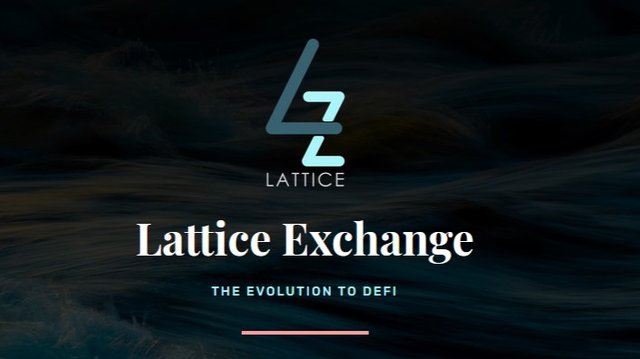How Lattice Exchange Is Forging Interoperability between Cross Chains
Decentralized Finance (DeFi) entails dedicated transactions that are facilitated from the sender to the receiver and vice versa. The idea is that cryptocurrencies needn’t be under any centralized control and that is what the DeFi system wants to encourage the more.
Moving on, Lattice Exchange is a dedicated cryptocurrency exchange that wants to create more solutions for blockchain networks, especially as they pertain to interoperability.
In this article, I treat some of the working instruments in place that the Lattice cryptocurrency exchange is using to forge maximum interoperability across different blockchain networks.
The Constellation Network
The overall purpose of Decentralized Finance (DeFi) will be defeated if there is no interoperability existing among blockchain networks.
Since traditional blockchain-based platforms seem to be lagging behind on that, it makes sense that the Lattice cryptocurrency exchange already has some solutions to address those anomalies.
And the most prominent of the working interoperable instruments is the Constellation Network. Also called the Hypergraph, this is a network that not only enthrones decentralization via the Directed Acyclic Graph (DAG). It also uses mathematical proofs and distributes data excellently without having to compromise on the interoperability of blockchain networks.

It is via the Hypergraph (the Constellation Network) that Lattice Exchange wants to build the cross-chain interoperability in multiple ways, including cloud infrastructures, scalability and excellent data management.
Interoperable Mechanisms
The quest to forge interoperability across multiple blockchain networks can be actualized if the following mechanisms used by Lattice Exchange are put to work:
Speed of Transactions
If transactions were facilitated in real-time, it will be easier to move the same from one blockchain network to another. That is what Lattice Exchange aims to achieve by using the Constellation Network as a graph-based distributed database that distributes and scales transactions faster than other blockchain protocols would.
In addition, there are 2 different ways that the Constellation Network will buoy speedy transactions on Lattice Exchange.
The first is the use of concurrent consensus mechanisms that see to the concurrent and parallel scaling of transactions. Worthy of mention is that these mechanisms do not weigh down or cause the network to be slow even when liquidity is high/orders are continually filled.
The second scalable instrument is the addition of multiple nodes to the network. When more nodes join the network, the network tends to be faster that it was. With that in place, infinite scalability for faster transactions will be fostered.
Built on Ethereum
In the last couple of years, we have seen surges in different blockchain networks. Ethereum is one of the most used blockchain networks because of the features that it offers.
So, at the start, Lattice Exchange will be built and deployed via the Ethereum blockchain. The reason for that being that the exchange wants to initially create more liquidity by aggregating liquidity from different Decentralized Exchanges (DEXs). The aggregation of liquidity is both to reduce slippage for traders and to create better pricing options for every DeFi investor.
Cross Chain Connectivity
In furtherance of the need for cross chain interoperability, Lattice Exchange took it further by creating a meta-ecosystem that thrives on feature-rich technologies. It is on that basis that Lattice Exchange will actualize the cross chain connectivity, fluid interaction via the connection of the Hypergraph protocol and the enhancement of value across different blockchain networks.
Maximum Security
Lags in traditional blockchain transactions aren’t always because the blockchain networks are slow per say. It is also because the security of transactions isn’t always assured. And where security is missing, investors would develop a feet of clay because they are not sure their transactions are protected.

However, you don’t have anything to lose because Lattice Exchange uses advanced security layers that include the oraclization of data via the appending of data collection sources on the Constellation protocol.
Second, the concurrent consensus mechanism used by Constellation protocol provides another security avenue because of the algorithmic execution of topological orders.
Decentralized to the Core
I readily accepted to review the Lattice Exchange after reading up what it has to offer via my Bounty0x account, Lyndieline.
I must mention that I wouldn’t have been interested in the project if there were no features in place to address the rising challenges in the Decentralized Finance (DeFi) industry, especially now that decentralization has become a problem too many for traditional DeFi platforms to uphold.
My interest in Lattice Exchange spiked when I realized that the platform is already doing something to address decentralization lapses.
It will interest you to know that the Constellation protocol being used by Lattice Exchange already has some acceptances in real-world, especially in the U.S where the government uses it for create Zero Trust, tokenize data/personal information and provide secured access to data.
Conclusion

From the look of things, the debut of the Lattice cryptocurrency exchange at this time that the DeFi industry is battling some issues couldn’t have been unconnected to the clamour for more enhanced DeFi systems.
The Constellation protocol looks good to become an ideal decentralized protocol for scaling decentralized transactions and I have no doubt that Lattice Exchange can meet up with the DeFi demands.
This is a Sponsored Article written by Lyndieline for a bounty reward from the Lattice Exchange.
Whitepaper: https://lattice.exchange/Lattice-Exchange-Official-Whitepaper.pdf
Website: https://lattice.exchange